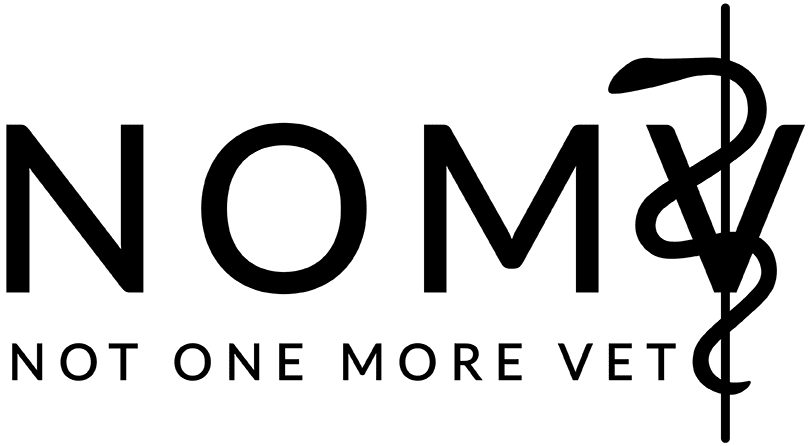Coaching as a Pathway to Well-Being in Veterinary Medicine
By Gigi Tsontos, LCSW MPA PCC NOMV Executive Director
September 2025
Veterinary medicine is a rewarding profession, but it is also one of the most emotionally demanding. Long hours, client pressures, financial stress, and the weight of caring for sick or dying animals contribute to high levels of burnout and mental health struggles in the field. A 2020 study found that over 70% of veterinarians reported some form of burnout, with stress and emotional exhaustion being major drivers (Moses et al., 2020). While therapy and crisis support are essential, proactive strategies are equally important to sustain well-being—and coaching is emerging as one such strategy.

What Is Coaching?
Coaching is a collaborative, strengths-based process designed to help individuals clarify values, set goals, and build skills for personal and professional growth. Unlike therapy, which focuses on mental health conditions, or mentorship, which emphasizes career guidance, coaching is future-focused and action-oriented. It empowers veterinary professionals to navigate challenges while developing resilience and leadership capacity (International Coaching Federation, 2023).
How Coaching Supports Well-Being
The pressures of veterinary practice often lead professionals to neglect their own needs. Coaching helps shift this pattern by providing tools and accountability to:
- Enhance self-awareness: Recognizing personal stress triggers and strengths.
- Build resilience: Developing practical coping strategies for high-stakes situations.
- Set healthy boundaries: Supporting work–life balance and preventing compassion fatigue.
- Strengthen communication: Improving client interactions and reducing team conflict.
- Foster leadership: Helping practice owners and managers create supportive workplace cultures.
In fact, research in healthcare has shown that physicians who received coaching experienced significant reductions in emotional exhaustion and burnout symptoms, along with improved job satisfaction (Dyrbye et al., 2019). Similar benefits are being seen in veterinary contexts, where leadership and resilience coaching programs are linked to stronger morale and staff retention (Cake et al., 2020).
Benefits for Individuals and Organizations
For individuals, coaching provides a safe space to reflect, reframe challenges, and rediscover purpose. For organizations, coaching contributes to reduced turnover, improved collaboration, and more positive practice cultures. When team members feel supported and empowered, client relationships improve, and ultimately, so does the care provided to animals.
Coaching as Part of a Well-Being Strategy
It’s important to note that coaching is not a replacement for therapy or systemic workplace changes. Instead, it should be integrated into broader well-being initiatives. Practical steps for practices and organizations include:
- Offering individual coaching to veterinarians and technicians.
- Incorporating team coaching to build trust and enhance communication.
- Providing leadership coaching for practice owners and managers.
By embedding coaching alongside peer support networks, mental health resources, and organizational change, the veterinary profession can create a more sustainable and supportive future.
Looking Ahead
Veterinary medicine is at a turning point. The well-being challenges facing the profession require proactive and innovative solutions. Coaching is not just a luxury—it’s a valuable pathway to resilience, growth, and fulfillment. By investing in coaching, veterinary teams can create healthier workplaces and ultimately improve the lives of the people who dedicate themselves to caring for animals.
References
- Cake, M. A., Bell, M. A., & Williams, J. C. (2020). Which professional (non-technical) competencies are most important to the success of graduate veterinarians? A Best Evidence Medical Education (BEME) systematic review. BMC Veterinary Research, 16(1), 1–15.
- Dyrbye, L. N., Shanafelt, T. D., Gill, P. R., Satele, D. V., & West, C. P. (2019). Effect of a professional coaching intervention on the well-being and distress of physicians: A pilot randomized clinical trial. JAMA Internal Medicine, 179(10), 1406–1414.
- International Coaching Federation. (2023). What is coaching? https://coachingfederation.org
- Moses, L., Malowney, M. J., & Wesley Boyd, J. (2020). Ethical conflict and moral distress in veterinary practice: A survey of North American veterinarians. Journal of Veterinary Internal Medicine, 34(6), 2130–2141.
Recent Posts
About Us
NOMV addresses well-being in the veterinary medical community through evidence driven programming that raises awareness on mental health in the community while providing innovative prevention and intervention programming.
